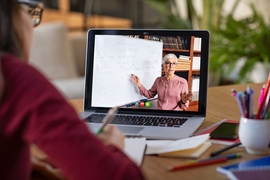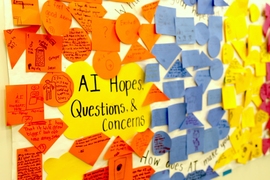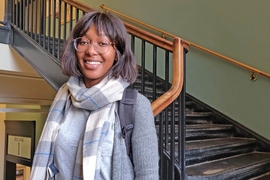School closures brought on by the Covid-19 outbreak have affected students across the globe. But while some districts have moved quickly to train teachers and buy software to facilitate online learning, others lack the resources to make a smooth transition to the virtual world.
Different home environments also exacerbate inequalities, as some households lack computers for each member of the family, rely on children to care for their younger siblings, or have parents deemed essential workers.
Those were the problems on the minds of a group of students from MIT and Harvard University when they started CovEducation, a mentoring platform that connects volunteer college students with children from low-income communities for academic support.
The organization, also known as CovEd, has scaled rapidly since its inception in mid-March, with more than 1,300 mentors and 850 K-12 students currently signed up.
The early tutoring sessions have also included help with career planning, the college admissions process, and any other academic issues the student may be struggling with. The sessions are meant to be as natural and responsive as CovEd’s fluid internal operations.
“One thing we’re trying to preserve [as we scale], which is the essence of our organization, is that this is a very tailored program for the students,” MIT undergraduate Daniela Velez says. “We match them in an organic way, trying to form very natural connections by finding mentors that are perfectly suited for them, and who can serve not only as a tutor, but also as a role model.”
CovEd catches on
CovEducation began as an idea in a small group chat among friends, including Evelyn Wong, a student at Harvard who is also an undergraduate research fellow at MIT. Harvard and MIT had just announced they would be moving to online instruction, and it was becoming clear that school districts would do the same.
The plan was to help K-12 students from low-income communities through virtual tutoring and mentorship. As the group chat grew, the idea excited a lot of people who were eager to volunteer their time and expertise.
“We all just wanted to turn this into an opportunity for the students to thrive and continue pursuing what they’re passionate about at home,” Velez says.
Wong made a Facebook page for CoveEducation on March 16, around the same time a group from MIT, including undergraduates Velez, Dheekshita Kumar, Sarah Dohadwala, and Tam Nguyen, had reached out separately offering to help pull together resources and develop the platform to match mentors and students. The MIT undergraduates, Wong, and Zoya Surani, an undergraduate at Harvard, make up CovEd’s management team, though the team stresses CovEd has always been a highly collaborative effort involving many volunteers.
The group received guidance through MIT Sandbox, MIT’s Office of the General Counsel, and the Boston University Law Clinic as they built out the organization. The structure of CovEd sprung up organically as new tasks presented themselves. Groups formed to handle things like outreach to superintendents, compiling resources for mentors and parents, and developing the soon-to-be-released web app.
“It’s very structured; we have this core group of nine people or so that decides the direction and the big tasks, and then each person in the group has a subgroup,” Dohadwala explains. “So we decide what we’re going to do at a high level, then go to our subgroup and say, ‘Here’s our slice of this task and how we’re going to do it.’”
As the team reached out to potential partners, they confirmed their concerns about some students getting left behind. They heard from parents who didn’t feel equipped to teach their children for a number of reasons, from their unfamiliarity with certain subjects to their difficulty with English. School districts also shared their struggles working with limited resources and time.
CovEd’s first mentoring sessions were held on March 30.
An instructional, social network
When mentors and students sign up on CovEd, they take a quick survey that asks about their interests, hobbies, and favorite subjects in school. Students can also say what they want to be when they grow up, and CovEd has been able to match those students with mentors studying in similar fields.
“I wish I had this resource as a child, because when you come to college your knowledge of what is possible expands,” Kumar says. “For me, I thought the only professions I could be were teacher, doctor, engineer, these generic terms, but there’s so much diversity in all of those things. … It can be an invaluable experience, getting to know someone who is doing something you’re interested in. They have a different lens of the profession to share.”
Most sessions are held on the video conferencing platform Zoom, which has a number of useful tools for education, including a “whiteboard” that users can share and collaborate on in real-time.
Parents are always present for the sessions, which are held about once a week, although students and mentors often work out meeting scheduling and frequency on their own.
“We’re trying to make it as flexible as possible, because we know everyone has different needs, and some students might want more lax academic support than others,” says Velez.
Many of the mentors have experience working in the education system or tutoring, which has allowed CovEd to pair students with special needs with mentors who have worked with those types of students in the past.
The project has led to an unexpected whirlwind of work for the management team, but it has also brought some notable benefits.
“I think one of the things a lot of students were sad about when we moved to virtual everything was that we wouldn’t make new friends or meet new people,” Kumar says. “I didn’t know any people [on the management team] before this, and I didn’t know a single person in my subgroup, so one of the other things that’s been really lovely is meeting other people who also care about these issues.”
The biggest payoff for the team, though, has come from getting positive feedback from students, parents, and mentors. To date, CovEd has paired 600 students with mentors, and stories have already begun to regularly brighten their day.
In one early matching session, the team was able to connect a student and mentor who both use the same hearing aid. In another case, a student said she wanted to be an FBI agent when she grew up, so the team was able to connect her to a mentor majoring in criminal justice.
Of course, mentors also connect with their students through smaller similarities. Other important questions on CovEd’s sign up form include “If you could have any superpower, which one would you choose?” and “Does pineapple belong on pizza?”
“We’re just looking forward to moments like that, where we find the student and mentor bond beyond the classroom,” Velez says.










